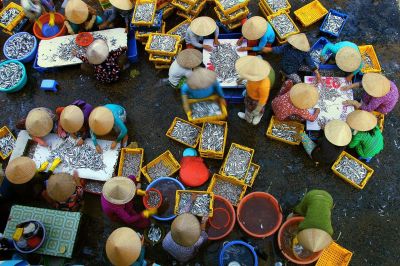Resilience Index Measurement and Analysis, Senegal, 2015
Senegal, 2015 - 2016
Get MicrodataIdentification
SEN_2015_RIMA_v01_EN_M_v01_A_OCS
Resilience Index Measurement and Analysis, Senegal, 2015
| Name | Country code |
|---|---|
| Senegal | SEN |
Other Household Survey [hh/oth]
Matam is one of the poorest regions of Senegal. Located in the northeast of the country, more than 45 percent of the population of Matam is under the poverty line (ANSD/SRSD, 2015). In this region, agriculture and pastoralism are the largest economic sectors, thus recent climatic changes strongly influence the number of malnourished people. Notwithstanding the numerous advances made in recent decades by the Government of Senegal in terms of increasing education rates and reinforcing numerous forms of infrastructure, such as roads, hospitals and schools, Matam still experiences infrastructure weakness and poor access to numerous basic services. Furthermore, Matam falls behind in a range of human development indicators in comparison to other Senegalese regions. Nevertheless, a Food and Agriculture Organization (FAO) resilience analysis based on the Enquête de Suivi de la Pauvreté au Sénégal I (ESPS I) found Matam to be one of the most resilient regions within Senegal. While this result may be in line with the typically high levels of adaptive, transformative and coping capacities of the poorest regions around the world, this result still warranted further investigation. Therefore, an ad hoc survey was carried out by FAO Resilience Analysis and Policies (RAP) team in Matam between December 2015 and January 2016, with the support of the Agence National de Statistique et de la Démographie (ANSD). The resilience survey was conducted within 410 households within the districts of Ranérou, Matam and Kanel in Matam Region.
Sample survey data [ssd]
Households
Scope
The survey covered sections on household characteristics, perception, adaptation strategies, social networks and shocks, employment, productivity and credit, as well as agricultural characteristics.
However, the corresponding dataset only includes variables used to calculate the Resilience Capacity Index (RCI). As such, questionnaire attached should only be used as guide to understand which questions were used in the calculation of these variables.
Coverage
Regional
Producers and sponsors
| Name | Affiliation |
|---|---|
| Food and Agriculture Organization | United Nations |
Sampling
The total sample counts 410 observations and is representative at the regional level; the household selection was made in collaboration with ANSD; the sampling framework utilized was that used for the Senegal National Census in 2014.
Survey instrument
Please refer to the Questionnaires for the value labels of the variables.
Data collection
| Start | End |
|---|---|
| 2015-12 | 2016-01 |
- Computer Assisted Personal Interview [capi]
All the interviews were carried out using a tablet computer and the Open Data Kit technologies for data collection and data entry; each enumerator was equipped with a tablet. The adoption of new technology reduces the time needed for interviews, lowers the rate of data collection errors, reduces data entry errors, and provides for adequate quality control of data collection almost in real time. The qualitative data collected in the field through focus groups was aimed at exploring the main constraints to resilience capacity at the community level and which coping strategies are implemented. The qualitative investigation was carried out from the 29th of December 2015 to the 9th of January 2016, conducting eight focus groups and ten in-depth interviews. These interviews covered previous situations of household vulnerability, the most frequent shocks faced, and which coping strategies were adopted in response.
Data Access
| Is signing of a confidentiality declaration required? | Confidentiality declaration text |
|---|---|
| yes | The users shall not take any action with the purpose of identifying any individual entity (i.e. person, household, enterprise, etc.) in the micro dataset(s). If such a disclosure is made inadvertently, no use will be made of the information, and it will be reported immediately to FAO |
Micro datasets disseminated by FAO shall only be allowed for research and statistical purposes. Any user which requests access working for a commercial company will not be granted access to any micro dataset regardless of their specified purpose. Users requesting access to any datasets must agree to the following minimal conditions:
- The micro dataset will only be used for statistical and/or research purposes;
- Any results derived from the micro dataset will be used solely for reporting aggregated information, and not for any specific individual entities or data subjects;
- The users shall not take any action with the purpose of identifying any individual entity (i.e. person, household, enterprise, etc.) in the micro dataset(s). If such a disclosure is made inadvertently, no use will be made of the information, and it will be reported immediately to FAO;
- The micro dataset cannot be re-disseminated by users or shared with anyone other than the individuals that are granted access to the micro dataset by FAO.
FAO. Resilience Index Measurement and Analysis (RIMA), Senegal, 2015. Dataset downloaded from https://microdata.fao.org.
Disclaimer and copyrights
The user of the data acknowledges that the original collector of the data, the authorized distributor of the data, and the relevant funding agency bear no responsibility for use of the data or for interpretations or inferences based upon such uses
Contacts
| Name | Affiliation | URL | |
|---|---|---|---|
| FAO RIMA Team | Food and Agriculture Organization | [email protected] | http://www.fao.org/resilience/background/tools/rima/en/ |
Metadata production
DDI_SEN_2015_RIMA_v01_EN_M_v01_A_OCS_FAO
| Name | Affiliation | Role |
|---|---|---|
| Ellestina Jumbe | Food and Agriculture Organization | Metadata producer |
| Office of Chief Statistician | Food and Agriculture Organization | Metadata adapted for FAM |
Metadata version
SEN_2015_RIMA_v01_EN_M_v01_A_OCS
